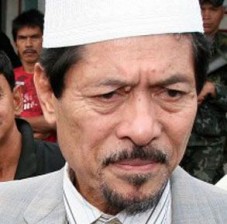
Mohagher Iqbal said the preliminary agreement his group signed Monday with Philippine authorities has brought more political concessions for the Moro people than the deal that Misuari signed in 1996.
Under the Framework Agreement, the Bangsamoro will have exclusive powers as well as shared powers with the central government, details of which will be ironed out by the parties beginning next month.
As defined in the Framework Agreement, the Bangsamoro will have some powers on election administration and “authority to regulate on its own responsibility the affairs of the constituent units” of the region.
The Bangsamoro also has competence over the Sharia system of justice and can institute alternative systems to resolve disputes.
Although it is silent on control of strategic minerals, the framework refers to Bangsamoro territory as “the land mass as well as maritime, terrestrial, fluvial and alluvial domains, and the aerial domain and the atmospheric space above it,” the governance of which is subject to further negotiations.
In the 1996 agreement between the government and the MNLF led by Misuari, strategic minerals are under the sole control of the national government although the region enjoys 50 percent of the revenues derived from their exploitation and many functions remain in the central government.
In the handling of fiscal resources, the Bangsamoro is granted the powers of generating and budgeting its “own sources of revenues, its share of the internal revenue taxes and block grants and subsidies” remitted by the national government or donors.
In defining the competence of Bangsamoro, the framework pact carried over the powers of the Autonomous Region in Muslim Mindanao to enter into economic agreements.
It will also have a congressional representative of its own under the party-list system aside from those representing the districts of its provinces and a Senate representative.
An inhabitant of the Bangsamoro will also be appointed to the Cabinet with the rank of secretary and each national government office shall have at least one official from the new entity.
In the framework agreement, both government and MILF also agreed on the appointment of a competent resident of the region to the Supreme Court, the Court of Appeals and the Judicial and Bar Council.
Iqbal said the framework agreement “does not diminish any bit the gains” of the Final Peace Agreement that Misuari concluded with the Ramos administration.
Before they rant against it, Iqbal urged critics of the Framework Agreement to read it in its entirety.
“We can task a neutral group to make a comparative study of both agreements. If they are true leaders, they should read first the documents,” he said.
Misuari, who has filed his candidacy for governor of the Autonomous Region in Muslim Mindanao, has criticized the Framework Agreement as a recipe for more violence in Mindanao.
Chief government negotiator Marvic Leonen has sided with Iqbal, saying the “government’s commitment with the MILF includes complying with its commitment to the MNLF.”
“There are various ways that the MNLF can cooperate with the current peace process with the MILF,” Leonen said.
Apart from offering seats on the 15-member Transition Commission to its members, presidential adviser on the peace process Teresita Quintos-Deles said the drafting of the Bangsamoro Basic Law will be an opportunity for the MNLF to help design the appropriate governance structure and processes for the new entity.